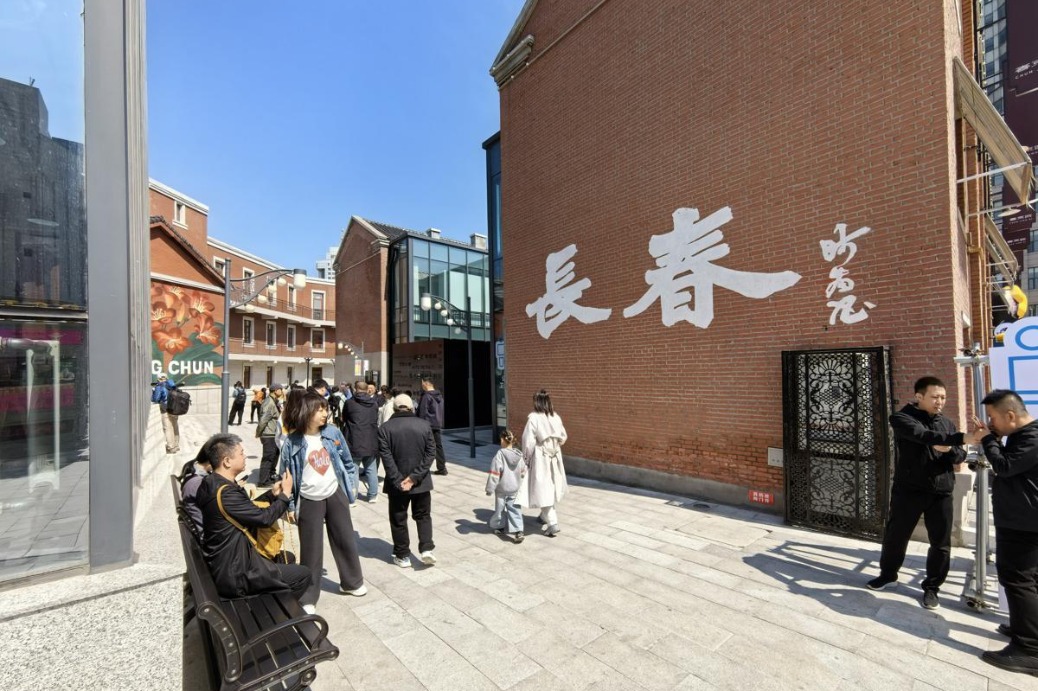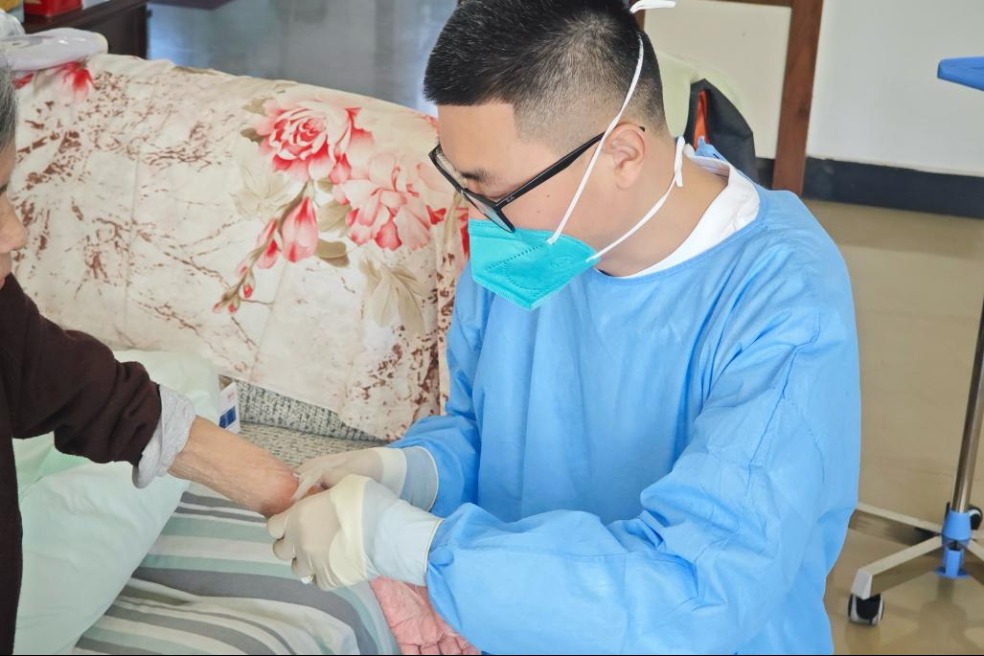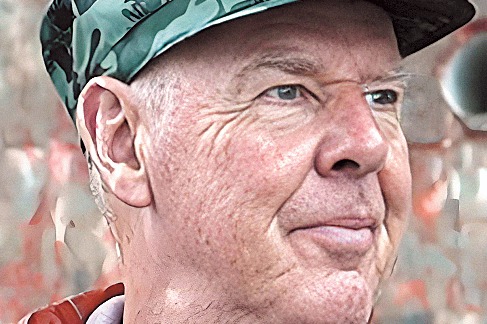Ray of hope for HK realty after curbs scrapped

Hong Kong's scrapping of all property market cooling measures has given its residential home market a shot in the arm. Experts believe the battered market may be out of the woods, with transactions and prices gradually stabilizing in the second half of this year. Oswald Chan reports from Hong Kong.

Residential home transactions in Hong Kong have seen significant increases after the special administrative region dropped all home-purchasing restrictions, with effect from Feb 28 this year.
While some industry experts have hailed the SAR's moves as a "positive step", others have warned that abundant supplies that stacked up after more than three years of COVID-19, coupled with continued high interest rates, may put a squeeze on property prices.
There were 3,600 firsthand property transactions from March 1 to 26 — a more-than-tenfold growth from the same period in the previous month, according to Sammy Po Siu-ming, CEO of Midland Realty's residential home business.
"In the secondhand market, there were about 130 transactions each week at the city's leading 35 housing estates in the first three weeks of March, compared with only 50 transactions per week before the market curbs were lifted," Po tells China Daily.
Po sees home prices picking up by 5 to 10 percent this year, while the number of firsthand and secondhand home transactions would reach 68,000.
Derek Chan Hoi-chiu, head of research at Ricacorp Properties, agrees. "The discarding of all tightening measures has reversed the situation. The volume of property transactions is expected to jump, with prices remaining stable and flat in April. If the market continues to be strong, prices would go up in May and June.
"We see prices rising by 5 to 8 percent for the whole of 2024 if local mortgage loan interest rates fall, and Hong Kong's economy will be more stabilized in the second half of this year," Chan says.
According to Ricacorp Properties, there were 3,648 firsthand residential home transactions from March 1 to 25 — an increase of 12.4 times compared with the previous month.
In the secondhand market, the average number of weekly home transactions at 50 leading housing estates from Feb 26 to March 3, March 4 to March 10, and from March 11 to March 17 had soared 1.8 times, compared with the previous three weeks.
A long-awaited move
The SAR government decided to cancel the Special Stamp Duty (SSD), Buyer's Stamp Duty (BSD) and the New Residential Stamp Duty (NRSD) payable for residential property transactions on Feb 28 in unveiling the 2024-25 Budget as part of a host of measures to boost the local economy dented by the pandemic and a sluggish recovery pace. Sellers and buyers of residential properties, however, still need to pay an ad valorem stamp duty (AVSD) at Scale 2 rates from HK$100 ($12.77) to 4.25 percent of the property prices involved.
Property pundits say dropping the levies will encourage more incoming talents and nonlocal buyers and investors to enter the market. Removing the SSD allows homeowners to dispose of their units at any time without penalty, while scrapping the NRSD enables buyers to purchase another residential unit without having to be taxed.

Jones Lang LaSalle estimates that buyers from the Chinese mainland accounted for 70 percent of recent primary sales of luxury residential properties worth HK$30 million or above, rebounding from less than 50 percent before the market cooling measures were abolished.
Eric Tso Tak-ming, chief vice-president of mReferral Mortgage Brokerage Services, says Hong Kong residents with mainland background and mainland customers are now more confident about buying Hong Kong residential properties.
"These purchasers are quick to see the investment value of Hong Kong residential properties after the cancellation of all stamp duty payments and the downward price corrections," Tso tells China Daily.
"On the other hand, Hong Kong residents are more cautious. They have to gauge the general economic situation, the interest-rate environment, as well as the stock market's performance before deciding to buy properties. They are also more eager to get the best possible bargain deals," he says.
mReferral Mortgage Brokerage Services says new mortgage-loan applications referred by the agency from March 1 to 25 have risen more than threefold, compared with the same period in the previous month, before all the home market cooling measures were dropped. In the same period, firsthand property mortgage loan applications accounted for 47 percent of the total number of loan applications, compared with 32 percent in February — up 15 percentage points.
Tso, however, expects the number of negative-equity cases to continue rising for a short period before declining. He anticipates that if local home prices could gain up to 10 percent this year, the number of negative cases would drop to just a few thousand.
The estimated number of residential mortgage loans in negative equity surged to 25,163 by late December, with an aggregate value of HK$131.3 billion. Most of them concerned banking staff housing loans, or residential mortgage loans under the mortgage insurance program, which generally have a higher loan-to-value ratio, according to the Hong Kong Monetary Authority.
The city's banking industry regulator in February adjusted the maximum loan-to-value ratios to 70 percent for residential properties for self-occupation valued at HK$30 million or below; and 60 percent for properties valued at HK$35 million or above. It also suspended the interest-rate stress test requirement for property mortgage lending that assumes a 200-basis-point rise in the mortgage rate.
Real estate analysts expect the HKMA's suspension of the interest-rate stress testing requirement to reduce buyers' entry costs, thus lifting the residential transaction volume. The loan-to-value relaxation is also likely to benefit the high-end luxury residential market.

Changes for the better
CCB International forecasts that Hong Kong home prices will normalize in line with the reversed demand-and-supply situation, with supply now outstripping demand. The investment bank expects the primary market to continue downsizing as the secondary market revitalizes.
Tso predicts that the total number of firsthand and secondhand residential transactions could exceed 60,000 by the end of this year.
Land Registry data show that the number of agreements for sale and purchase of residential building units reached 43,002 last year, while there were 3,971 similar agreements in March just after the property-market cooling measures were announced — a 67-percent, month-on-month increase from February, but a 40-percent year-on-year slump.
The Rate and Valuation Department's home price index showed that residential prices have been on a losing streak for 10 consecutive months and have plummeted to their lowest levels since October 2016 — having fallen by about 1.7 percent month-on-month, and by 13 percent year-on-year in February. The price gauge does not reflect the market trend after all the market curbs were withdrawn.
The home price index had slumped 7 percent in 2023, with a cumulative downward correction of 24 percent from its peak in September 2021.
Hong Kong had introduced a raft of property market tightening measures to cool down the sizzling home market since 2010, including introducing the SSD in November 2010, the BSD in October 2012, the double AVSD in February 2013, and the NRSD in November 2016.
"Dropping these curbs is in recognition of Hong Kong's housing market facing a very different situation from the last decade. During that time, record-low interest rates and mainland buyers had fueled a massive surge in prices. Now the city faces stubbornly high borrowing costs, while the mainland's struggling economy and housing sector restructuring has spilled over onto Hong Kong, thus reducing demand," says Carlos Casanova, Asia senior economist at Switzerland-based private bank Union Bancaire Privee.
Amid the softening of Hong Kong's residential-home market since 2022, the government had already relaxed some of the measures, including adjusting the value bands of the AVSD (Scale 2 rates), payable for the sale, purchase or transfer of residential and nonresidential properties, in February 2023, as well as reducing the respective rates of the BSD and the NRSD by half (from 15 percent to 7.5 percent), shortening the applicable period of the SSD from three years to two years, and introducing a stamp duty suspension arrangement for incoming talents buying residential properties in October 2023.
Colliers Hong Kong is glad to see the government taking the initiative to remove all the restrictions. "This will boost market sentiment and lift the secondhand residential market," says Kathy Lee Yuen-yan, Colliers Hong Kong's head of research.
"But the new policy's impact would be more evident until the second half of this year, when a potential interest-rate cut is expected. With the possible cuts in interest rates and the demand stemmed from Hong Kong's talent admission schemes, we expect housing prices to rise by 5 to 10 percent in the subsequent year," she says.
CBRE Hong Kong Head of Research Marcos Chan Kam-ping describes the scrapping of all the curbs as a "positive move" for the market. "But any pickup in the transaction volume will be gradual as high borrowing rates will remain a hurdle for rental recovery, and vacancy improvements will be vital for a more sustainable recovery in investment demand."
Eddie Kwok Wai-yan, senior director of CBRE Hong Kong Valuation and Advisory Services, is worried that abolishing the demand-side management measures for residential properties may spur more homeowners to surrender their units (acquired in recent years) at lower prices, and this could put pressure on prices. "In the medium term, home prices will be affected by interest-rate movements and developers' pricing strategy."
Joseph Tsang Hon-ping, chairman of Jones Lang LaSalle in Hong Kong, expects home sales to rise significantly — from 10 to 15 percent — this year, but home prices will drop 10 percent in the same period.
"It will require interest-rate cuts and an improved economy for prices to bottom out and rebound because negative factors — such as high interest rates and a weak economy — still exist. Just withdrawing the measures would not be enough to reverse the downward trend," he says.
S&P Global Ratings warns that local home prices will continue to fall this year before stabilizing in 2025, with oversupply persisting for the next one to two years. The credit agency argues that although the recent abolition of cooling measures may stimulate demand, high interest rates and abundant near-term supply will still cloud the recovery of local property prices.





































